Events
Nanobiotechnology in natural food colours
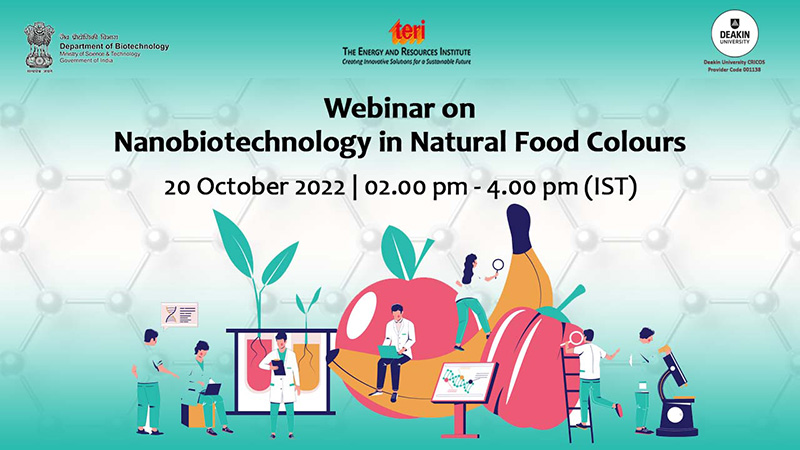
Colour influences consumer food preferences. Food colour is considered the essential product-intrinsic sensory cue when setting people’s expectations regarding the likely taste and flavor of food and drink. For this reason, color has been added to food to enhance it for hundreds of years. Originally, ingredients providing color were made from existing natural sources or grown locally in home kitchens. The industrialisation of food production drove the need for consistent food colours in every production batch and stability throughout the product's shelf life.
The rapid development of nanotechnology is expected to transform many areas of food science and the food industry. Food Nanotechnology offers significant potential benefits, but emerging concerns arise from its novel physicochemical properties. Nanotechnology holds great promise to provide benefits not just within food products but also around food products. Nanotechnology introduces new chances for innovation in the food industry at immense speed. The webinar will help us understand the future possibilities of nanobiotechnology in natural food colors.
Know more
Agenda | Register here | Flyer
EFFECTS OF MULTIPLE NANOPARTICLES ON PLANTS AND DATA FROM IN VITRO AND IN SITU
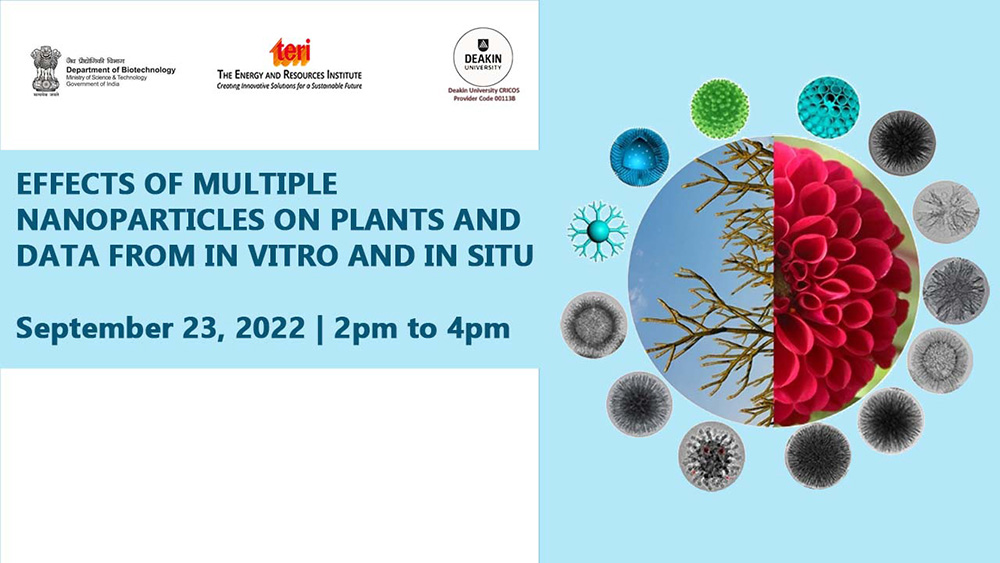
The Energy and Resources Institute (TERI) is organising a webinar on "Effects of Multiple Nanoparticles on Plants and Data from in-Vitro and in-Situ" on September 23, 2022 from 2.00 PM to 4.00 PM (IST).
In recent years, an increasing need for nanotechnology in various industries has been causing a colossal environmental dispersion of nanoparticles. A concern about nanoparticles' interaction with flora and fauna is raised due to a growing load in the environment. The research performed in the last decade shows how metal and metal oxide nanoparticles influence plant metabolism.
A more precise domain characterisation will allow a better dealing with genotype-by-environment-by-management interactions. A variety of field trial entails growing different crop varieties alongside each other to compare their performance across any number of characteristics directly. It can be highly controlled and scientific or very informal. The webinar will help us use field trial data to understand the future possibilities of plant-nanoparticle research. Know more
Agenda | Register here | Flyer
Drone Technology for Specialised Agrochemicals in Precision Agriculture: Awareness and Adoption in India
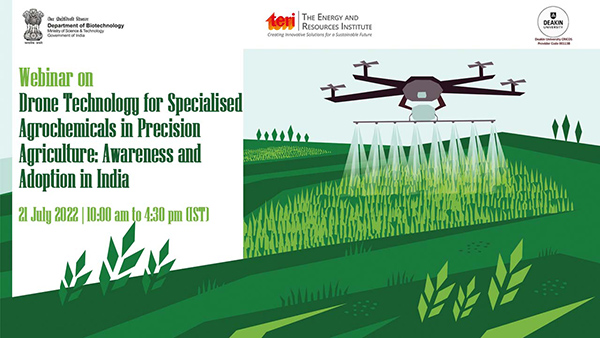
The Energy and Resources Institute (TERI), in partnership with the Department of Biotechnology and Deakin University South Asia, is organising a hybrid event on 'Drone Technology for Specialised Agrochemicals in Precision Agriculture: Awareness and Adoption in India' on July 21, 2022, at the TERI-Deakin Nanobiotechnology Centre, TERI Gram, Gwal Pahari, Gurugram, India.
The event would offer policy-makers, industry leaders and academia an opportunity to understand the role of drones in precision agriculture, and what lies ahead for India and the world in terms of agriculture using drones.
There is an urgent need for the agricultural community to adopt modern technologies to increase crop productivity. To this end, drones provide almost limitless opportunities ranging from monitoring soil and crop health, planting, seed sowing, spraying fertilizers and pesticides, and irrigation in regions with scarce water. They have increasingly become an essential part of precision agriculture and food security.
The ease of operation in difficult terrains and the minimal need for manual intervention make them an attractive choice for the future of precision agriculture. However, like any other modern technology, the usage of drones also comes with some challenges. The safety issues related to drone operations and their cost competitiveness make their mainstreaming difficult for the grassroots farming community.
Know more
Webinar on “ELECTROLYSIS OF WATER: THE WAY FORWARD”
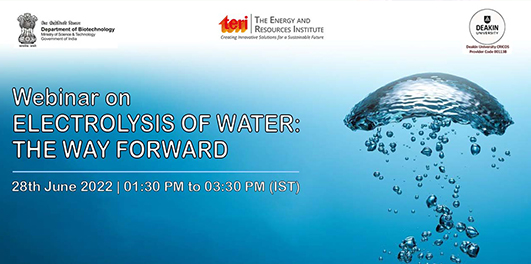
The DTD-RNA project is dedicated to substantially enhancing research outcomes by promoting effective collaborations amongst researchers from diverse and complementary fields across continents.
Electrolysis of water has come a long way since its discovery around 200 years ago. The world is working at a remarkable pace to cope with the energy demand and replace conventional fossil-fuel-based energy with affordable, reliable, and cost-effective green energy sources, like hydrogen. The electrolysis of water is one of the go-to techniques for the same. However, the choice of catalyst, electrolyte and operating conditions play a significant role in energy generation and pilot/industrial-scale production.
The webinar aims to act as a platform to recall the history of electrolysis of water and understand the present and future potential of water electrolysis in green energy generation. By bringing together participants from academia, industry and regulatory bodies together the webinar will work on brainstorming about the role of water electrolysis as a future energy source.
Know more
E-Summer School on “NANOSAFETY CHALLENGES: RETHINKING NANOSAFETY”
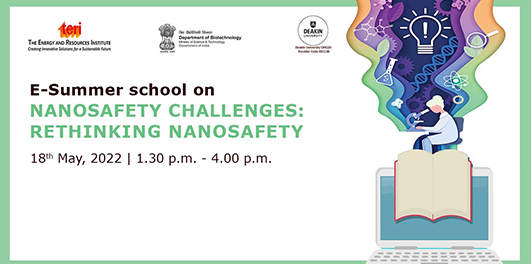
The Summer School will provide a series of lectures on nanofsafety challenges and enable a free exchange of ideas and sharing of experiences from experts in an interactive format.
The Energy and Resources Institute (TERI), in collaboration with, the Department of Biotechnology, Government of India is organising an E-Summer School on "Nanosafety Challenges: Rethinking Nanosafety" on May 18, 2022.
Hands on Training Module - Quality Control of Arbuscular Mycorrhizal Biofertilizers on 3rd March 2022
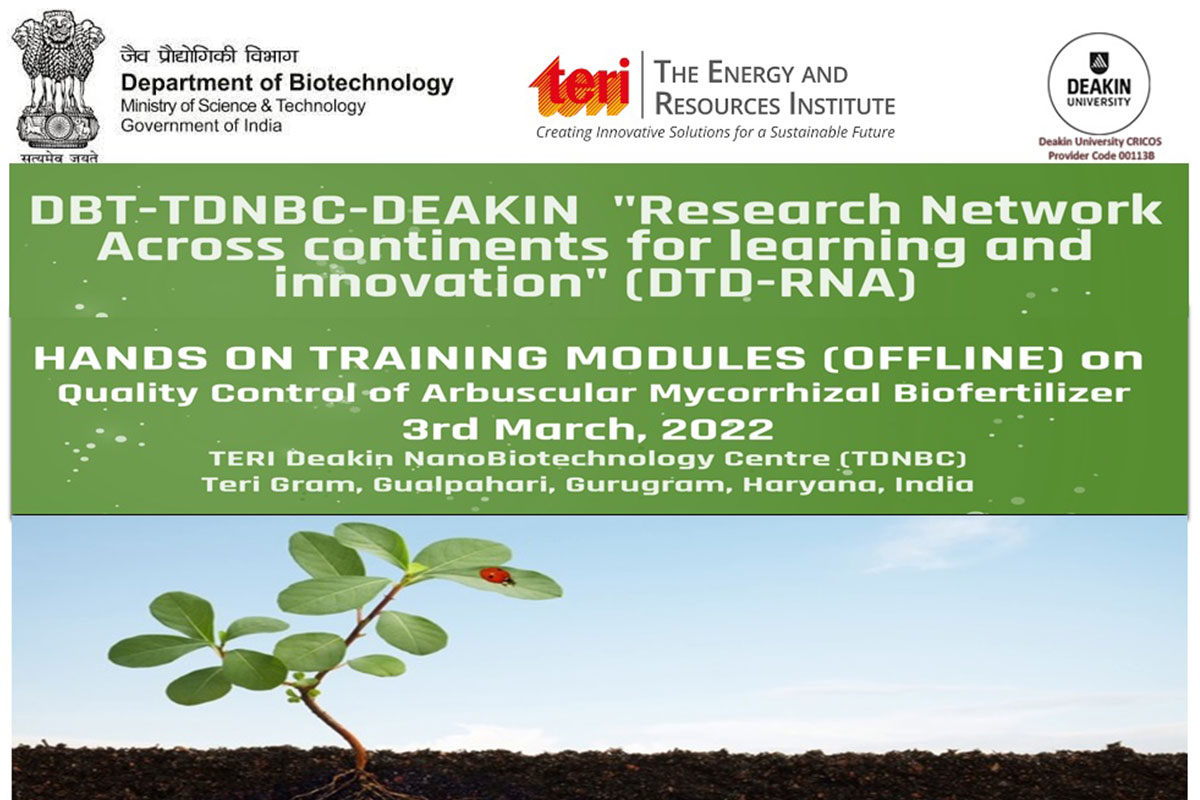
The TERI-Deakin Nanobiotechnology Centre (TDNBC) in collaboration with the Department of Biotechnology, Government of India is hosting an in-person Instructor-Led Live Hands-on-Training to help students obtain information more systematically and practically on Quality Control of Arbuscular Mycorrhizal Biofertilizers. The training sessions will be held on March 3, 2022 from 10:00 AM to 3:30 PM.
Hands on Training Modules (Offline) on Synthesis and Characterization of Nanomaterials - On 22nd February, 2022
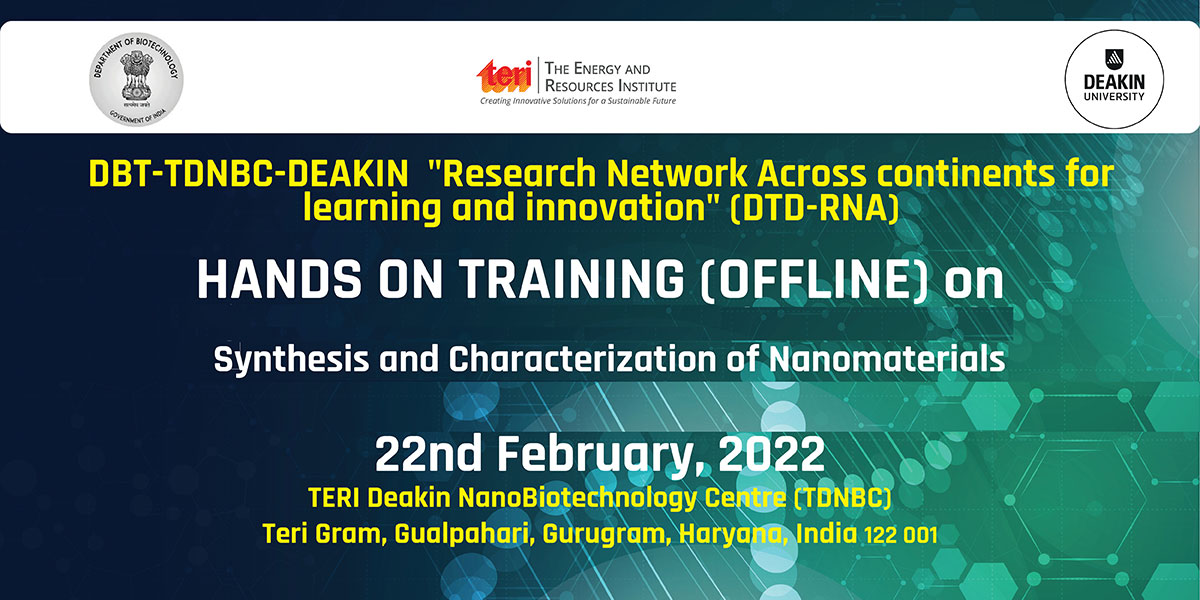
TERI-Deakin Nanobiotechnology Centre (TDNBC), Gurugram, India in association with Department of Biotechnology, Govt. of India under "DBT-TDNBC-DEAKIN-Research Network" across continents for learning and innovation (DTD-RNA)" project organized hands on training (offline) on "Nanomaterials Synthesis, Characterization and Application in Seed coating for Climate Smart Agriculture" on 22nd February, 2022 from 10:00 AM to 1:00 PM.
The hands on training module aimed to cover one of the most important scientific trends, synthesis of nanomaterials and their characterization for their intended applications.
The day began with the welcome address by Dr. Pushplata Singh, Director, TERI- Deakin Nanobiotechnology Centre, Gurugram, followed by an introductory virtual tour of TERI and TDNBC nanobiotechnology research achievements and facilities. The program was moderated by Dr. Shruti Shukla, TDNBC, TERI.
Subject expert of nanomaterials, Dr. Palash Kumar Manna gave a detailed lecture on synthesis and characterization of various nanomaterials and how to tune them for the desired applications. The session continued with laboratory visit and hands on training by Dr. Suneeti Singh on nanomaterials synthesis and their characterization via different techniques such as DLS, Zeta potential, FTIR, and UV spectroscopy.
Hands on Training Modules (Offline) on Seed coating for Climate Smart Agriculture - On 22nd February, 2022
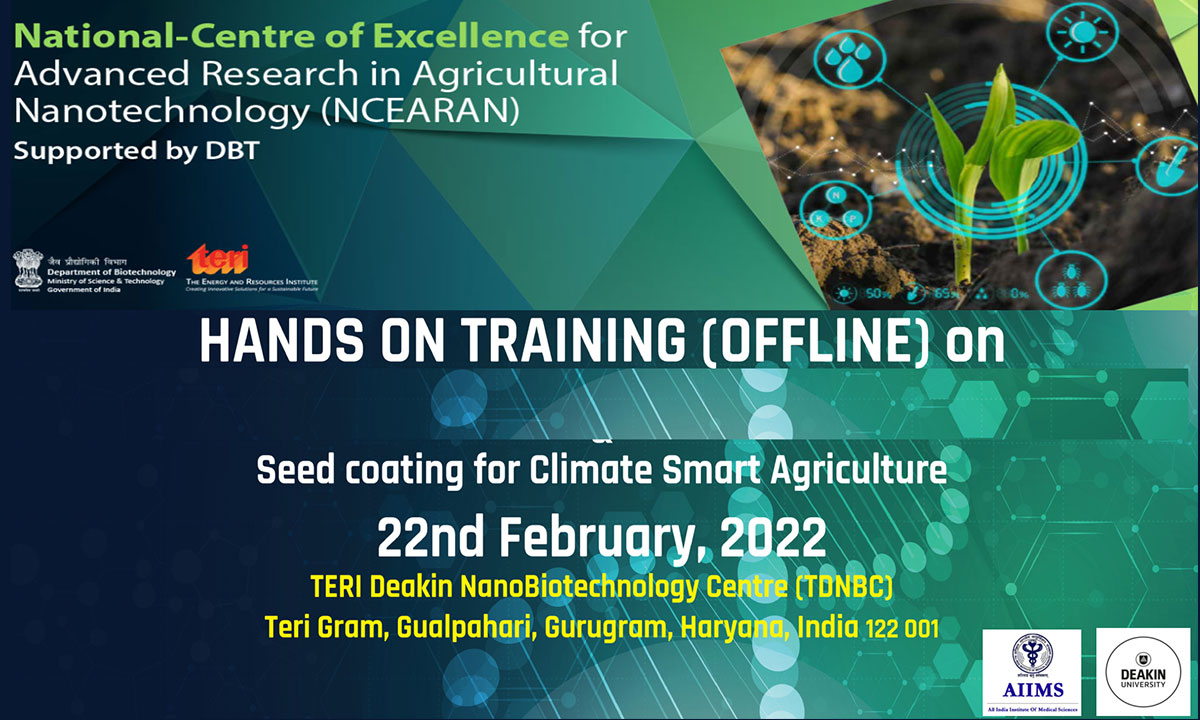
TERI-Deakin Nanobiotechnology Centre (TDNBC), Gurugram, India in association with Department of Biotechnology, Govt. of India under "DBT-TDNBC-DEAKIN-Research Network" across continents for learning and innovation (DTD-RNA)" project organized hands on training (offline) on "Nanomaterials Synthesis, Characterization and Application in Seed coating for Climate Smart Agriculture" on 22nd February, 2022 from 2:00 PM to 3:30 PM.
The hands on training module aimed to cover one of the most important scientific trends, synthesis of nanomaterials and their characterization for their intended applications.
The day began with the welcome address by Dr. Pushplata Singh, Director, TERI- Deakin Nanobiotechnology Centre, Gurugram, followed by an introductory virtual tour of TERI and TDNBC nanobiotechnology research achievements and facilities. The program was moderated by Dr. Shruti Shukla, TDNBC, TERI.
Subject expert of seed coating, Dr. Rita Choudhary elaborated the topic by explaining advanced techniques of nano-seed coatings. She stressed on the benefits of this technique to protect seeds from microbial losses and enhancing their germination and nutrient use efficiencies. The experimental demonstration of polymeric formulations and seed coating were also carried out during the session.
Winter School on Advanced Applications of Nanotechnology for Food and Environment - On 15th February, 2022

TERI-Deakin Nanobiotechnology Centre (TDNBC) in collaboration with Department of Biotechnology, Government of India is organizing a Winter School on "Advanced Application of Nanotechnology for Food and Environment," February 15, 2022 from 10:00 AM to 03:15 PM IST. The intense one-day programme aims to promote research perspective and impart transformative educational experience to high achievers and ambitious students.
NanoforAgri-2021: Technology readiness and overcoming regulatory barriers to implement nanotechnology-enabled agriculture for sustainable future - On 8th November, 2021
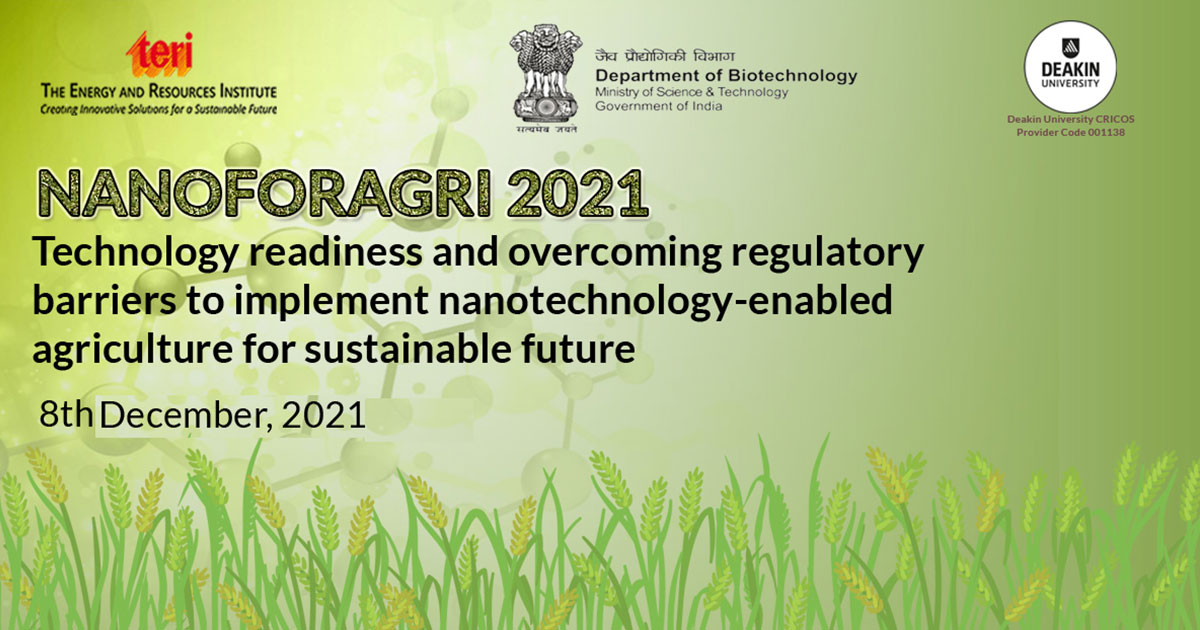
The Energy and Resources Institute (TERI) will be hosting the The 5th annual International Conference on 'NANOFORAGRI 2021' at TERI RETREAT, Gual Pahari, Gurugram.
The two-day International Conference will focus on the world's readiness for achieving the UN's Sustainable Development Goal: End hunger, achieve food security, and promote sustainable agriculture, through the application of nanotechnology. The high-level event will work towards engaging stakeholders involved in NanoAgriculture with experts across the globe to showcase breakthrough research towards nano-driven shift in agriculture practices.
Webinar Series on Waste-Derived Nanomaterials: Part-II - BIO2NANO: BioResources to Sustainable Nanoproducts- Interventions, Current Status & the Future Perspective - On 20th October, 2021 at 02:00 PM to 04:00 PM IST
The webinar aims to provide an overview of some of the most recent trends, challenges, and applications in the field of bio(nano)products derived from sustainable resources.
Webinar on 'Waste-Derived Nano-materials: Status, Impact and Future Prospects' - On 7th October, 2021 at 02:00 PM to 04:30 PM IST
The Energy and Resources Institute (TERI) with the Department of Biotechnology (DBT), Government of India, and Deakin University South Asia is organising a webinar on "Waste-Derived Nano-materials: Status, Impact and Future Prospects" on October 7, 2021 from 2 - 4:30 PM.
The webinar aims at highlighting various leads being taken to derive nano-materials from different waste resources via a 'Circular Economy' model.
Nanostructured Materials in Food Packaging, Preservation and Diagnostics - On 26th August, 2021 at 02:00 PM to 04:00 PM IST
TERI is organising a webinar on 'Nanostructured Materials (NSMs) in Food Packaging, Preservation and Diagnostics' on 26 August between 2-4 PM (IST).
The benefits of nanotechnology for the food industry are many and are expected to grow with time. However, public acceptance of food and food-related products containing nanomaterials will depend on their safety. In this regard, the webinar aims to raise nanotechnological awareness in food and feed sectors amongst researchers, scientists, students, industries, and more.
E-Workshop on Quality Control of Arbuscular Mycorrhizal Biofertilizers - On 9th April, 2021 at 02:00 PM to 04:00 PM IST
DTD-RNA (DBT -TDNBC - DEAKIN – Research Network Across continents for learning and innovation (DTD-RNA)) Network organized an “E-Workshop on Quality Control of Arbuscular Mycorrhizal Biofertilizers” on 9th April, 2021, 2.00-4.00 PM (IST). The aim of the E-workshop was to educate, train and spread awareness among the researchers, professionals and consultants working at industries, research institutes, universities and regulatory organizations about the fundamentals, wet lab protocols, data analyses and report generation about the quality evaluation of AMF-based products.
The event commenced with the introductory remarks and welcome address by Dr Alok Adholeya, Program Director, Sustainable Agriculture, The Energy and Resources Institute (TERI), New Delhi, India. Session 1 focussed on the “Quality control of arbuscular mycorrhizal fungi based products and current perspectives on their policies and regulations in India and Europe”. Three expert talks were delivered in this session by Dr Gagnesh Sharma (Regional Director, Regional Centre Of Organic Farming, Jabalpur, Madhya Pradesh, India), Dr Christian Hecker (Representative of the presidency at IF TECH, France) and Dr Alok Adholeya followed by an interactive session. Thereafter, Session 2 began with the Web-based demonstration for quality control analysis of various AMF-based formulations with two special talks and demonstration sessions. Special talks were delivered by Dr Ankit Kumar and Dr Pushplata Singh about the laboratory protocols recommended for Quality evaluation of AMF products and molecular tools for quality check of AMF products respectively. This was followed by Web-based demonstrations of step-wise quality control analysis of AMF-based formulations (Technical and Finished products) and demonstration on molecular characterization of AMF-based products by Dr Leena Johny and Ms Pratima Vasistha. Session 3 elaborated aboutthe data collection and descriptive analyses for quality control of AMF-based products and was demonstrated by Dr Shivani Srivastava followed by an interactice session with the participants. An overwhelming response was received in the interactive session where both industrial and academia participant raised and discussed their queries for the expert speakers and gained valuable insights. Towards the end of session 3, Dr Alok Adholeya proposed a vote of thanks to all the dignitaries, industrial and academia participants and organizing team members for making this e-workshop a success.
The E-workshop was attended by participants from India, Kenya, Indonesia, Chile, Venezuela, USA, UK, Greece, Australia, Morrocco, Germany, South Africa and Costa Rica.
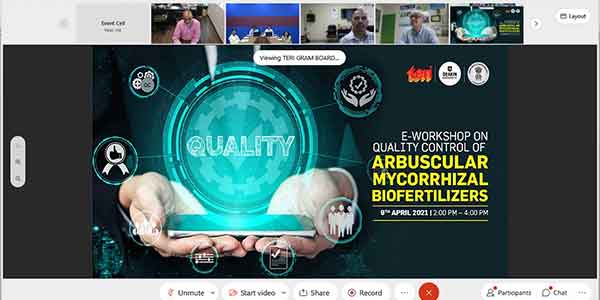
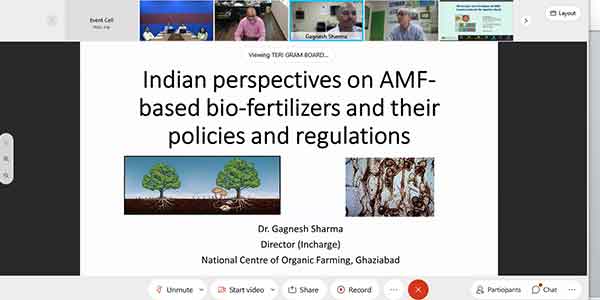
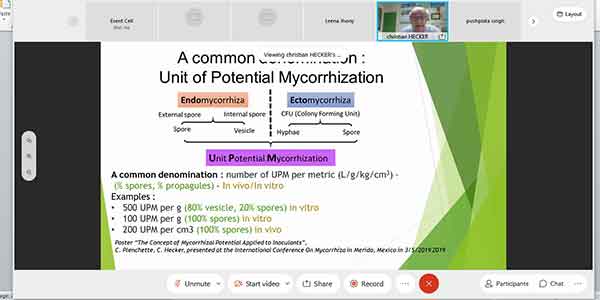
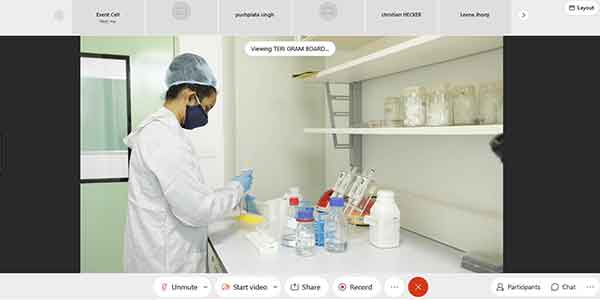
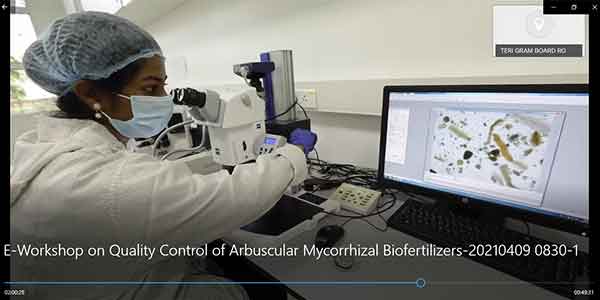
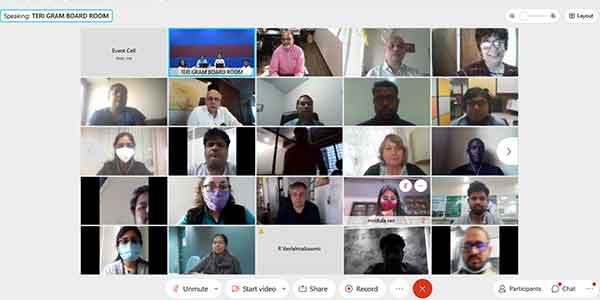
High-End Characterization of Micro-Algae: Overcoming the Technological Barriers - On 3rd to 4th March, 2021 at 10:30 AM - 02:10 PM IST
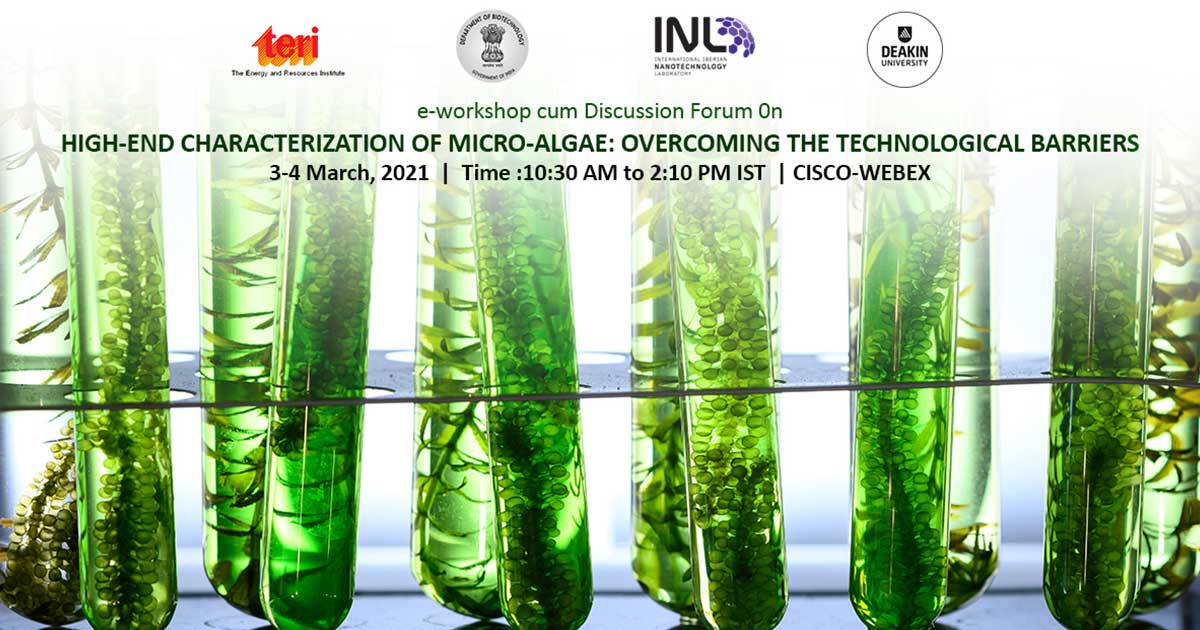
TERI in partnership with Deakin University, Australia, Department of Biology, Government of India and International Iberian Nanotechnology Laboratory (INL), Portugal is organising a two-day e-workshop cum discussion on the topic, 'High-End Characterization of Micro-Algae: Overcoming the Technological Barriers'
Webinar on nanosafety/econanotoxicity and regulatory aspects of nanoproducts - On 19th February, 2021 at 2:00 PM - 4:00 PM IST
The webinar will present several topics related to research and development for safe nanoproducts and suitable guidelines for assessment of nano-agro and nano-pharmaceutical products for regulatory clearance.
Interdisciplinary collaboration in science is transforming human life with emerging technologies like nanotechnology that are leading to incremental as well as disruptive innovations. Novel products with nanotechnology intervention are projected to revolutionize the health care practice, agriculture and food sectors in future. The emphasis is to create technologies that have high commercial and societal impact. However, the scientific understanding related to evaluation of nanoproducts for efficacy and risk to human health and environment is a critical gap concerning their successful commercialization. The novel multifunctional nanomaterials based products require cautious selection of the available tests as well as additional new tests for quality, safety and efficacy assessment in future. The Indian Safety Guidelines for Nanopharmaceuticals and Nano-Agri products have been developed recently. In these guidelines it has become evident that not all nanoproducts can be assessed for efficacy and potential health and environmental hazards by using the conventional guidelines or by one common set of test guidelines. Also, the international guidelines may need modification with new edition from time to time to address specific categories of nanoproducts.
This webinar aims to bring together leading academic researchers, representatives from international and national regulatory bodies and professionals, technocrats and industries to exchange and share their experiences on nanosafety/econanotoxicity and regulatory aspects of nano-agri products & food products; and nano-pharmaceuticals & cosmetic products.
This webinar will present several topics related to research and development for safe nanoproducts and suitable guidelines for assessment of nano-agro and nano-pharmaceutical products for regulatory clearance. Topics discussed will include nanoproducts type, potential rules and regulations associated with each product type and best practices for minimizing potential health and environmental impacts.
4th International Conference on 'NANOFORAGRI 2020'
The 4th International Conference on 'NANOFORAGRI 2020' was organized by TERI-Deakin Nanobiotechnology Centre, TERI in partnership with Department of Biotechnology (DBT), Government of India on November 5 and 6, 2020. The Virtual International Conference organized through DTD-RNA Network focussed on 'Application of Nanotechnology for Sustainable, Productive and Safer Agriculture and Food System' and was dedicated to the application of nanoscale science and technology in re-engineering quality, quantity, and safety of agricultural and food systems. Due to the current global situation with the COVID-19 pandemic, the conference held online and brought together highly accomplished experts with diversified backgrounds from across the globe. The event was truly interdisciplinary in nature and highlighted global challenges and harmonized systems for nano solutions for agriculture and food systems. Domain experts from the USA, Canada, Spain, Ireland, Australia, and India delivered talks on the session themes.
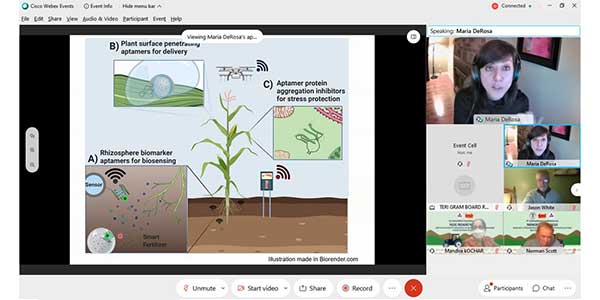
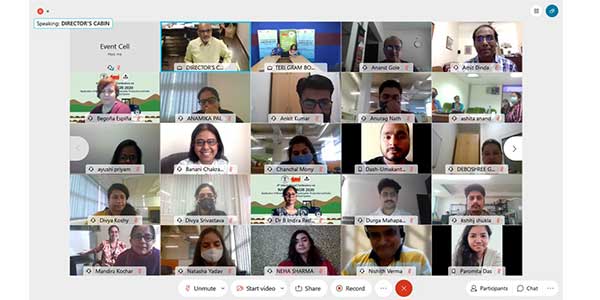
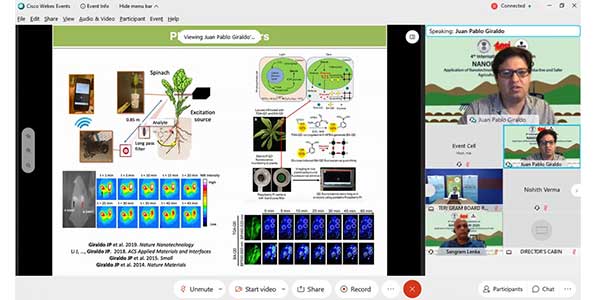
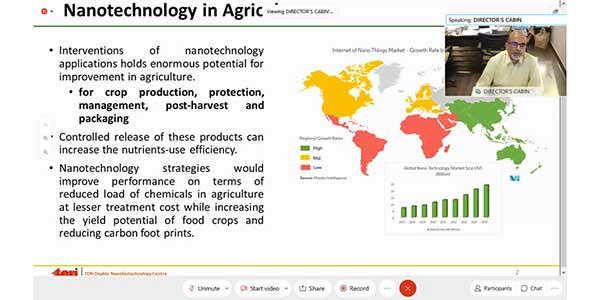
On the first day, two thematic scientific sessions on 'Applications of Nano-based Agrochemicals in Moving Towards Sustainable Plant Health, Agriculture and Food Systems' and 'Food Security and Role of Artificial Intelligence in Plant Health Nanotechnology' were organized. And, day two included three thematic sessions followed by a panel discussion. The sessions further focussed on development and application of Sensors in the field of AgriNanotechnology and regulatory aspects. The virtual event also witnessed Scientist and Scholar Oral Research Pitches providing a glimpse into current research projects. The Science-Society-Policy actions for Agriculture and Food Nanotechnology being spearheaded by the DBT and supported by TERI were a key focus of the conference. The conference also involved thought-provoking discussions in the related fields and focussed on developing scientific linkages to develop technologies and fostering innovation in agricultural research.
Webinar on Microalgal diversity: Potential sources of materials and value-added products and their economy
TERI Deakin Nanobiotechnology Centre (TDNBC) through its DTD-RNA (DBT-TERI-Deakin Research Network Across Continents for Learning and Innovation) platform in association with International Iberian Nanotechnology Laboratory (INL), Portugal have been successful in organizing this webinar on 3rd September 2020 with an aim to highlight emerging technologies in Algal research, challenges and opportunities for growth in near future. Dr Alok Adholeya (DTD-RNA Coordinator, TDNBC and chair of the webinar) released the first DTD-RNA Newsletter online that accentuated its intent under this august forum. He solicited all the participants to join the platform in developing International Centre for Translational Research for research training and education in biological synthesis of Nano materials. He emphasized on the importance of microalgal research and set the context for the webinar.
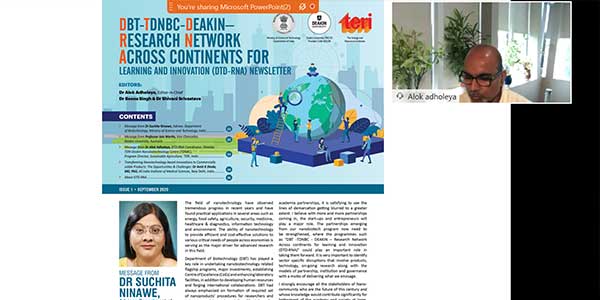
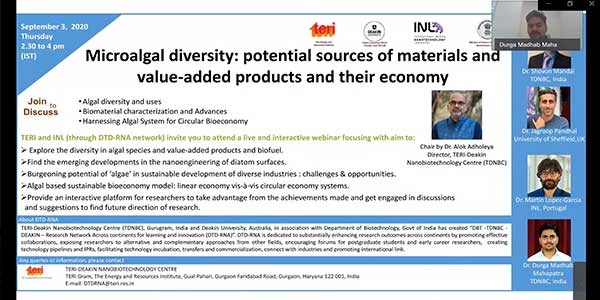
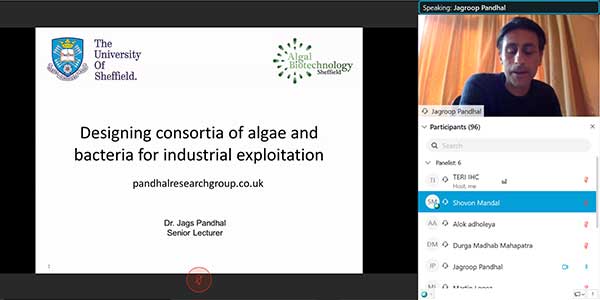
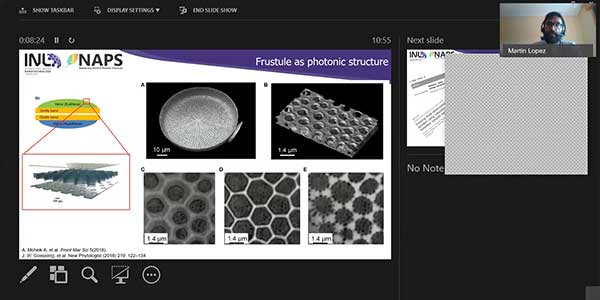
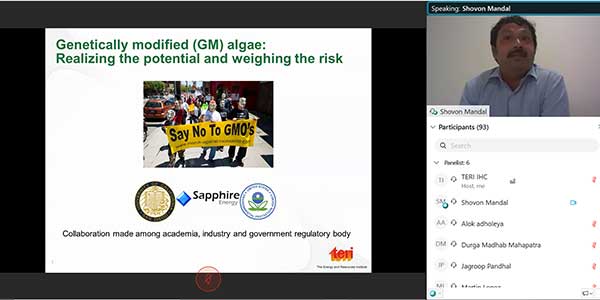
The speakers in the webinar include: Dr. Shovon Mandal (TDNBC), Dr. Jagroop Pandhal (University of Sheffield, UK), Dr. Martin Lopez (INL, Portugal) and Dr. Durga Madhab Mahapatra (TDNBC). Dr. Mandal presented the challenges and futuristic possibilities of algal biofuels with prominence on risk assessment of Genetically Modified (GM) alga in fields and use of consortia for biofuel production. Dr. Pandhal presented the essentials of designing consortia of algae and bacteria for industrial exploitation and elucidated the necessity of metaproteomics in unravelling microbial processes in industrial system and natural ecosystem. Dr. Lopez shed light on intricate diatom exoskeleton enumerating promising properties and its application in nanotechnology. Dr. Mahapatra discussed on circular bioeconomy and algal biofactories from a wastewater perspective.
106 participants from India, UK, Portugal, Italy, United Arab Emirates, Malaysia, and US joined the session. Students, researchers and professionals from both industry and academia took part in the event.
Discussion Forum on Industrial Perspectives
The Energy and Resources Institute (TERI) in association with Department of Biotechnology (DBT), Government of India (through DBT funded DTD-RNA project) organized discussion forum on “Landscaping of Industrial Perspectives on Biofertilizer Policy and Regulations on Biologicals in Agriculture” on 14th February at India Habitat Centre, Lodhi Road, New Delhi.
The Discussion Forum had following objectives:
- To bring together leading industries to exchange and share their experiences on all aspects of Biologicals in Agriculture.
- To provide a premier interdisciplinary platform for industries to present and discuss the most recent innovations, trends, and concerns as well as practical challenges encountered and solutions adopted.
- To provide the platform to the industries to discuss their concerns related to the production, marketing and the existing regulations.
- To develop the core team of industries and other stakeholders to develop a basic operating framework (or a white paper) for biofertilizer policy revisions that can be proposed to Ministry of Agriculture/Department of Biotechnology.
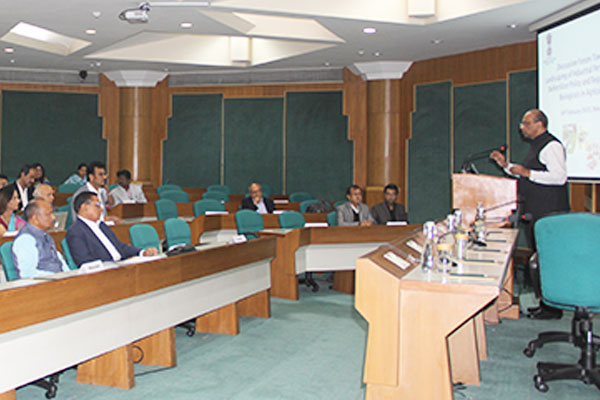
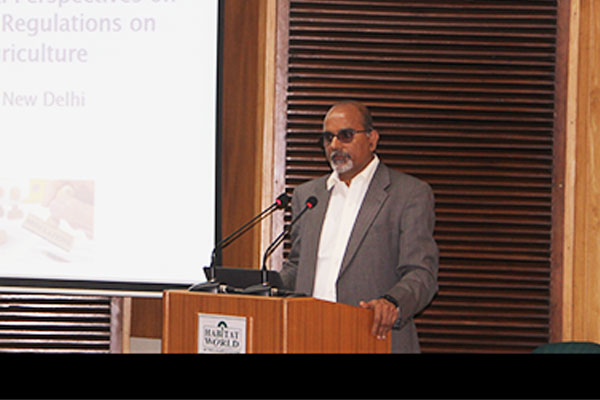
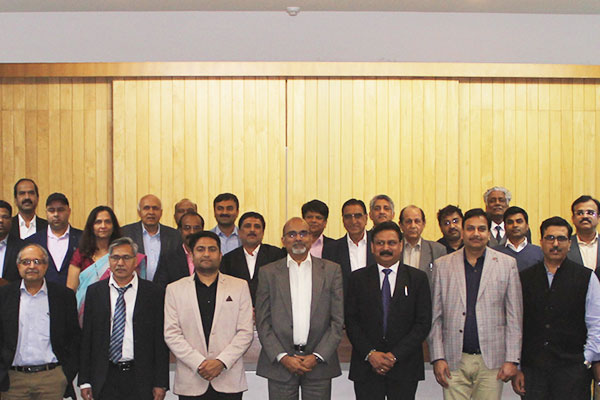
Dr. Ajay Mathur, Director General, delivered the welcome address. Dr Alok Adholeya chaired the technical session. Major players of biofertilizer industries (approx 70 delegates) from across India participated in the discussion forum. TERI will prepare the recommendation report of this discussion forum and will present to DBT and Ministry of Agriculture.
Signing of MOU between TERI-Deakin Nanobiotechnology Centre (TD-NBC), Gurugram and International Iberian Nanotechnology Laboratory (INL) Braga
The INL International Iberian Nanotechnology Laboratory, Portugal is an international legal framework that performs interdisciplinary research, deploy and articulate nanotechnology for the benefit of society. Read more
MoU was announced during State Visit of President of Portugal on 14th February 2020. This partnership has an aim to strengthen and facilitate the exchange of scientific and technical knowledge in the field of materials science and nanotechnology.
Training workshop on Quality Control of Mycorrhiza for National Centre of Organic Farming (NCOF), India
A one-day hands on training programme was organized on January 10, 2020 for scientific staff from the National Centre of Organic Farming (NCOF) to create awareness about the quality evaluation of mycorrhizal biofertilizers. There were 18 participants from diverse backgrounds who came to attend the training programme from different parts of the country. The programme aimed to strengthen the quality regulation of mycorrhizae- based biofertilizer products by way of capacity building of the scientific staff of the regulatory bodies. The training programme included an interactive session and discussions on various quality parameters of products as per guidelines pertaining to the Fertilizer Control Order (FCO) 1985, Govt. of India and the challenges faced by regulatory staff and the manufacturing industries.
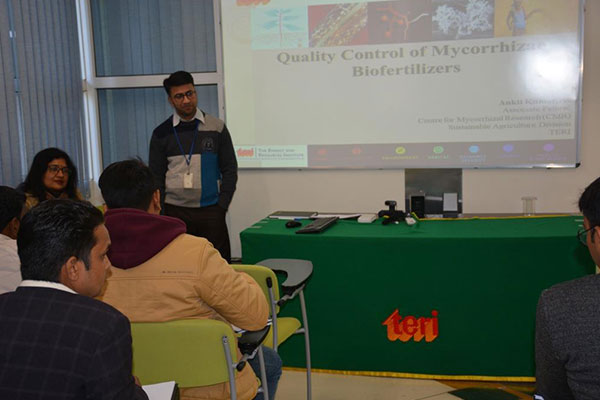
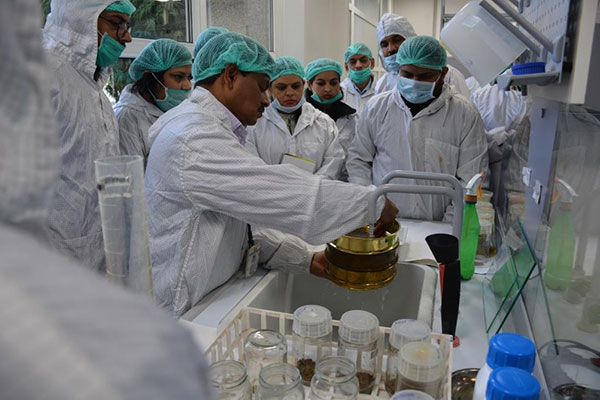
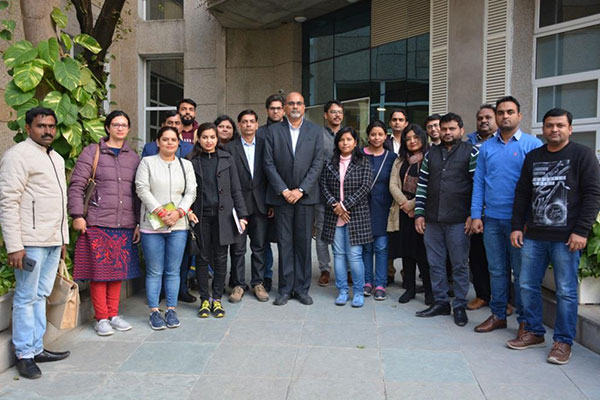
The hands on training session included the isolation of mycorrhizal spores from the soil and other various kinds of mycorrhizae-based market products followed by microscopic analysis. The participants got an opportunity to understand the fundamental basis of morphotypic characterization mycorrhizae, viability assessment of spores in the products, and root colonization by mycorrhizae. This was followed by a laboratory tour of the participants and a brief technical session on the raw data collection, analysis of the raw data, and report preparation.
Short-term training for Young Researcher
Short term (14 days) training on Mycorrhiza was organized for PhD Research Scholar of Plant Genetic Engineering Lab, Dept. of Biotechnology, Bharathiar University, Coimbatore and Functional Cell Reprogramming and Organism Plasticity (FunCROP), University of Évora, Évora, Portugal.
TERI launches nanobiotechnology networking platforms with Deakin University, Department of Biotechnology
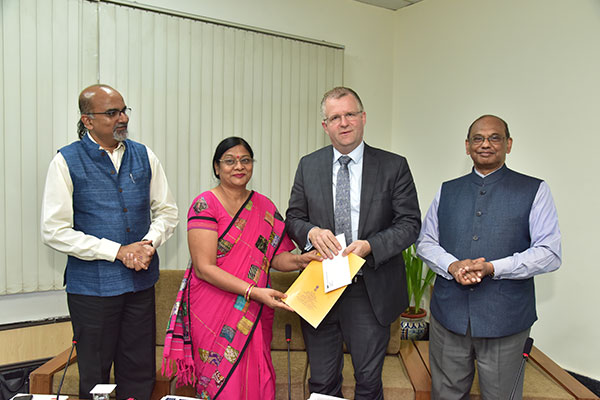
The two initiatives aim to create nanotechnology innovation hubs and networking between research institutes, universities, and industries, apart from offering joint facilities and infrastructure for collaborative research. The DTD-RNA will cover the areas of Synthesis of nanomaterials, Food preservation using novel nanofibres, Cost effective natural biodegradable polymer based nanocomposites, Natural food colours, Mycorrhiza, Seed coating technology of microbes and nanofertilisers, and Reclamation technologies.
Launching the Nanobiotech@DBT website, Dr Suchita Ninawe, Adviser, DBT, said, "Our aim is to connect lab to industries to end users". On the occasion, Dr Ajay Mathur, Director General, TERI, said, "Networking and outreach programmes will enable the transfer of knowledge and technology for what will happen in the world."
Professor Iain Martin, President and Vice Chancellor, Deakin University, was also present for the launch. He said, "DTD-RNA was envisioned to nurture innovation in nanobiotechnology. Several labs will be created as country hubs weaving a network of research institutions across continents." Dr Alok Adholeya, Senior Director, Sustainable Agriculture, TERI, added, "The network and institutional structure will re-emphasise TERI-Deakin Nanobiotechnology Research Centre's (TDNBC) willingness to promote a research network in a highly specialised and next-generation science platform".

